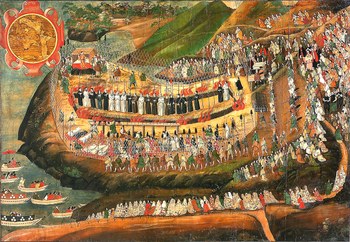Il convegno indaga le connessioni globali e la disseminazione di opere, ideali e visioni nei mondi iberici tra Europa, Americhe, Africa e Asia nei secoli XVI-XVIII.
Data:
Luogo: Palazzo Marescotti (Salone Marescotti, via Barberia 4 - Bologna)
Tipo: DAMSLab

Organizzato da: Maria Vittoria Spissu (DAR, UNIBO)
Con il sostegno di: Marie Skłodowska-Curie Actions COMCON Project and DAMSLab UNIBO
Con il supporto di: the Center for Renaissance Studies – The Newberry Library, Chicago and the Center for Iberian Historical Studies – Saint Louis University
Giovedì 19 Giugno, ore 10,40
Venerdì 20 Giugno, ore 9,20
Il convegno affronta il tema delle connessioni globali, concentrandosi sulla circolazione di visioni del mondo, ruolo dei committenti, trasformazioni di modelli, opere transculturali e azioni trasformative, ideali mobili, opere che incorporano ideologie e utopie salvifiche, opere che riflettono conflitti o aspirano a sanare divisioni, opere strumentalizzate e immagini che visualizzano redenzione, negoziazione o pacificazione idealizzata.
Si concentra sulle reti globalizzanti che hanno promosso strategicamente una unità universale e sulla sinergia generata dal sistema imperiale-coloniale, fondato su sovranità, egemonia, gerarchie e autorità locali. Esplora la costruzione di figure esemplari, casi eroici, valori moralizzanti e virtù normative nel Cattolicesimo globale, senza tralasciare la realtà rizomatica e polifonica che ha resistito a tali ambizioni di controllo e omogeneizzazione.
Il convegno indaga costellazioni di immagini e culti devozionali, storie connesse, mobilitazione di conoscenze, fabbricazione di idee e narrazioni, così come l’imposizione o la contestazione di ideali e emozioni collettive, all’interno dell’Impero degli Asburgo, in Europa, nelle Americhe iberiche, in Africa e in Asia durante il Rinascimento e il Barocco globali.
Vengono considerati oggetti/immagini e idee rappresentativi di luoghi e comunità molteplici, ma anche opere e narrazioni che hanno cercato di sfuggire a prospettive totalizzanti/autoritarie. Il convegno analizza opere e azioni che racchiudono ideali collettivi, così come oggetti/immagini e incontri/scontri che rivelano prossimità e distanza, condivisione e cancellazione, possesso e resistenza.
----
This symposium addresses the issue of global connections by focusing
on the circulations of world views, distributed agency, the transformation
of models, transcultural/transformative objects, nomadic ideals, utopian objects promising salvation, objects embodying conflicts or aspiring to heal division, weaponized objects, and images visualizing redemption, negotiation
or idealized pacification.
It focuses on the globalizing networks that strove toward universal unity and the synergy generated by the imperial colonial system of sovereignty, hegemony, hierarchy, and local authorities. It explores role models, heroes, moralizing values, and normative virtues within Global Catholicism while embracing the rhizomatic/polyphonic reality that resisted controlling and unifying ambitions.
The symposium examines constellations of images and devotional cults, connected histories, the mobilization of knowledge and ideologies,
the fabrication of ideas and narratives, and the imposition or contestation of ideals and social emotions within the Habsburg Empire in Europe, the Iberian Americas, Africa, and Asia during the Global Renaissance and the Global Baroque.
It considers ideas and objects representative of multiple places
and communities, but it also aims to give a voice to images and stories
that endeavored to escape such a totalizing perspective.
This symposium investigates works and actions embedded within collective ideals while delving into objects and encounters/clashes that reveal distance and closeness, sharing and erasure, possession and resistance.
THURSDAY, JUNE 19, SALONE MARESCOTTI
Welcome & Opening Address
10:40-11:00 Maria Vittoria Spissu, Department of the Arts, University of Bologna
Marian Guerilla, Mines of Hearts, Giant Rhizomes, and Rivers of Idealized Pacification: ‘A Brave New World’
Session I: Pioneering ~ Reframing ~ Envisioning
Chair: Lia Markey, Center for Renaissance Studies, The Newberry Library, Chicago
11:00-11:20 Alessandra Russo, Columbia University, New York
Ars in a Novus Orbis: Inceptions of a Newly Found Term
11:20-11:40 Shannah Rose, Institute of Fine Arts, New York University | American Academy in Rome
Lorenzo Pignoria and the Remediation of Mexican Deities in Early Modern Rome
11:40-12:00 Vanessa A. Portugal, Trinity College Dublin
A Cosmological Model from the New World. Reflections from Saint Augustin in the Tierra Caliente of Michoacán
12:00-12:20 Q&A
12:30-14:10 Lunch
Session II: Performing ~ Unfolding ~ Fabricating
Chair: Alessandra Russo, Columbia University, New York
14:20-14:40 Marta Albalá Pelegrín, California Polytechnic State University, Pomona
Empire on Display: Staging Iberian Monarchs in Papal Rome
14:40-15:00 Lia Markey, Center for Renaissance Studies, The Newberry Library, Chicago
Urbano Monte’s World Map in Spanish Milan: Materiality, Circularity, and Imagery
15:00-15:20 José Joaquín Araneda Riquelme, Università Roma Tre
Colonial Objects on Board! Augustinian Agents and Political Communication from the Andes to Rome and Madrid (1640-1700)
15:20-15-40 Q&A
15:40-16:00 Break
Session III: Championing ~ Enlightening ~ Striving
Chair: Christine Göttler, Universität Bern
16:00-16:20 Raphaèle Preisinger, Kunsthistorisches Institut, Universität Zürich
Constructing Missionary Heroism: The Martyrs of Japan in a Transcontinental Perspective
16:20-16:40 Antonin Liatard, Université Paris Nanterre
Spotless Mirror and Jesuit Aesthetic Models between Spanish Netherlands and Latin America
16:40-17:00 Fernando Loffredo, Stony Brook University, New York
Global Eruptions: New Devotions and the Ecologies of Fear across the Spanish Empire
17:00-17:20 Q&A
FRIDAY, JUNE 20, SALONE MARESCOTTI
Session IV: Melting ~ Refounding ~ Transforming
Chair: Raphaèle Preisinger, Kunsthistorisches Institut, Universität Zürich
9:20-9:40 Christine Göttler, Universität Bern
Sites of Conversion: Rubens’s Studio, the Antwerp Mint, and the Spanish Empire
9:40-10:00 Katherine Mills, Harvard University | Kunsthistorische Institut in Florenz
How to Recover from Disaster: Local Stonemasons Rebuild Cuzco in the Aftermath of the 1650 Earthquake
10:00-10:20 Francisco Montes González, Universidad de Sevilla
Tempesta en México: Una interpretación iconológica de los enconchados de la Conquista
10:20-10:40 Q&A
10:40-11:00 Break
Session V: Challenging ~ Uprooting ~ Regenerating
Chair: Marta Albalá Pelegrín, California Polytechnic State University, Pomona
11:00-11:20 Nicolás Kwiatkowski, Universidad de San Martín – CONICET | Universitat Pompeu Fabra
Elephants, Drugs, Books and the Inquisition. Garcia de Orta, from the Iberian Peninsula to Goa
11:20-11:40 Fabien Montcher, Center for Iberian Historical Studies, Saint Louis University
El Arte Nuevo of Natural History: Revealing the Power of ‘Local Nature’
11:40-12:00 Javier Patiño Loira, University of California, Los Angeles | I Tatti, The Harvard University Center for Italian Renaissance Studies
A World Without Models: Truffles’ Impossible Families in Early Modern Italy
12:00-12:20 Q&A
Closing remarks
12:20-12:40 Maria Vittoria Spissu, DAR – UNIBO
12:40 Lunch